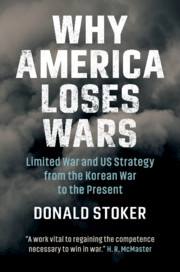Book contents
- Why America Loses Wars
- Why America Loses Wars
- Copyright page
- Dedication
- Contents
- 1 Are We at War? What Do We Want? And Do We Want to Win?
- 2 The Way We Think about War (Particularly Limited War) Is Broken: Here Is How We Fix It
- 3 The Political Objective: Why Nations Fight (Limited) Wars
- 4 Constraints: Or Why Wars for Limited Aims are So Difficult
- 5 Strategy: How to Think about Fighting for a Limited Political Objective
- 6 And You Thought the War Was Hard: Ending the War and Securing the Peace
- Conclusion: Is History Rhyming?
- Acknowledgments
- Notes
- Bibliography
- Index
3 - The Political Objective: Why Nations Fight (Limited) Wars
Published online by Cambridge University Press: 09 August 2019
- Why America Loses Wars
- Why America Loses Wars
- Copyright page
- Dedication
- Contents
- 1 Are We at War? What Do We Want? And Do We Want to Win?
- 2 The Way We Think about War (Particularly Limited War) Is Broken: Here Is How We Fix It
- 3 The Political Objective: Why Nations Fight (Limited) Wars
- 4 Constraints: Or Why Wars for Limited Aims are So Difficult
- 5 Strategy: How to Think about Fighting for a Limited Political Objective
- 6 And You Thought the War Was Hard: Ending the War and Securing the Peace
- Conclusion: Is History Rhyming?
- Acknowledgments
- Notes
- Bibliography
- Index
Summary
It is critical to understand the political objective or aim for which the war is being fought. These aims can be offensive, such as seizing a piece of a neighbor’s territory, or defensive, meaning holding what one has. This gives us a firm analytical foundation and the why of the war. One must understand the value each combatant places on the objectives because this helps determine the nature of the war, how long it will be fought, where, and at what cost. But we must remember that the objectives can change. Sometimes this is good. Sometimes this is bad. Leaders must understand when this happens and the effects, because changing the objective means you have embarked upon a different or even a new war and thus changed its nature. For example, the US changed from a limited to an unlimited objective during the Korean War when it decided to destroy the North Korean regime and unify the peninsula. In Iraq in 2003, the US fought the war to overthrow Saddam’s rule – an unlimited aim – but was soon fighting to prop up the new government it had established – a limited, defensive aim. The political aim determines everything.
Keywords
- Type
- Chapter
- Information
- Why America Loses WarsLimited War and US Strategy from the Korean War to the Present, pp. 44 - 80Publisher: Cambridge University PressPrint publication year: 2019

